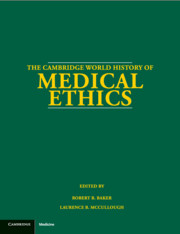Book contents
- Frontmatter
- PART I AN INTRODUCTION TO THE HISTORY OF MEDICAL ETHICS
- PART II A CHRONOLOGY OF MEDICAL ETHICS
- PART III DISCOURSES OF MEDICAL ETHICS THROUGH THE LIFE CYCLE
- PART IV THE DISCOURSES OF RELIGION ON MEDICAL ETHICS
- PART V THE DISCOURSES OF PHILOSOPHY ON MEDICAL ETHICS
- PART VI THE DISCOURSES OF PRACTITIONERS ON MEDICAL ETHICS
- PART VII THE DISCOURSES OF BIOETHICS
- 38 The Discourses of Bioethics in the United States
- 39 The Discourses of Bioethics in the United Kingdom
- 40 The Discourses of Bioethics in Western Europe
- 41 The Discourses of Bioethics in Post-Communist Eastern Europe
- 42 The Discourses of Bioethics in Latin America
- 43 The Discourses of Bioethics in East Asia
- 44 The Discourses of Bioethics in South Asia
- 45 The Discourses of Bioethics in Sub-Saharan Africa
- PART VIII DISCOURSES ON MEDICAL ETHICS AND SOCIETY
- Appendix: Biographies: Who Was Who in the History of Medical Ethics
- Bibliography
- Index
39 - The Discourses of Bioethics in the United Kingdom
from PART VII - THE DISCOURSES OF BIOETHICS
Published online by Cambridge University Press: 28 May 2012
- Frontmatter
- PART I AN INTRODUCTION TO THE HISTORY OF MEDICAL ETHICS
- PART II A CHRONOLOGY OF MEDICAL ETHICS
- PART III DISCOURSES OF MEDICAL ETHICS THROUGH THE LIFE CYCLE
- PART IV THE DISCOURSES OF RELIGION ON MEDICAL ETHICS
- PART V THE DISCOURSES OF PHILOSOPHY ON MEDICAL ETHICS
- PART VI THE DISCOURSES OF PRACTITIONERS ON MEDICAL ETHICS
- PART VII THE DISCOURSES OF BIOETHICS
- 38 The Discourses of Bioethics in the United States
- 39 The Discourses of Bioethics in the United Kingdom
- 40 The Discourses of Bioethics in Western Europe
- 41 The Discourses of Bioethics in Post-Communist Eastern Europe
- 42 The Discourses of Bioethics in Latin America
- 43 The Discourses of Bioethics in East Asia
- 44 The Discourses of Bioethics in South Asia
- 45 The Discourses of Bioethics in Sub-Saharan Africa
- PART VIII DISCOURSES ON MEDICAL ETHICS AND SOCIETY
- Appendix: Biographies: Who Was Who in the History of Medical Ethics
- Bibliography
- Index
Summary
INTRODUCTION
In 1963, “four lectures and a conference” on “issues raised through the practice of medicine” were organized by what became the London Medical Group (LMG). The subjects discussed are not recorded in the chronicle of the LMG's first 10 years (Shotter 1975a). By 1965, the LMG program comprised sixteen lectures, a conference, and study seminars on topics including abortion, sterilization, birth control, suicide, pain and the care of the dying, prolongation of life in unconscious patients, clinical experimentation, the hospital as a community, and the welfare state (Shotter 1975b). These were not yet described as “medical ethics,” which was still commonly identified with professional etiquette. During the 1970s, however, it began to be established as a term also covering an increasing number of morally and politically problematic issues in health care. “Bioethics” was and still is used more rarely in Britain, and often for issues, especially ecological and environmental, not directly related to health care.
THE ERA OF TRUSTING ATTITUDES IN DOCTORS
Before the advent of LMG, many British doctors believed that medico-moral questions “should be discussed only between medical colleagues – and in camera” (Shotter 1975b). Professional ethics was governed by the General Medical Council, a statutory but largely self-regulatory body created in 1858 (see Chapter 36), and since the turn of the century the British Medical Association (the doctors’ trade union) had a Central Ethical Committee to advise it on the subject.
- Type
- Chapter
- Information
- The Cambridge World History of Medical Ethics , pp. 486 - 489Publisher: Cambridge University PressPrint publication year: 2008
- 2
- Cited by



